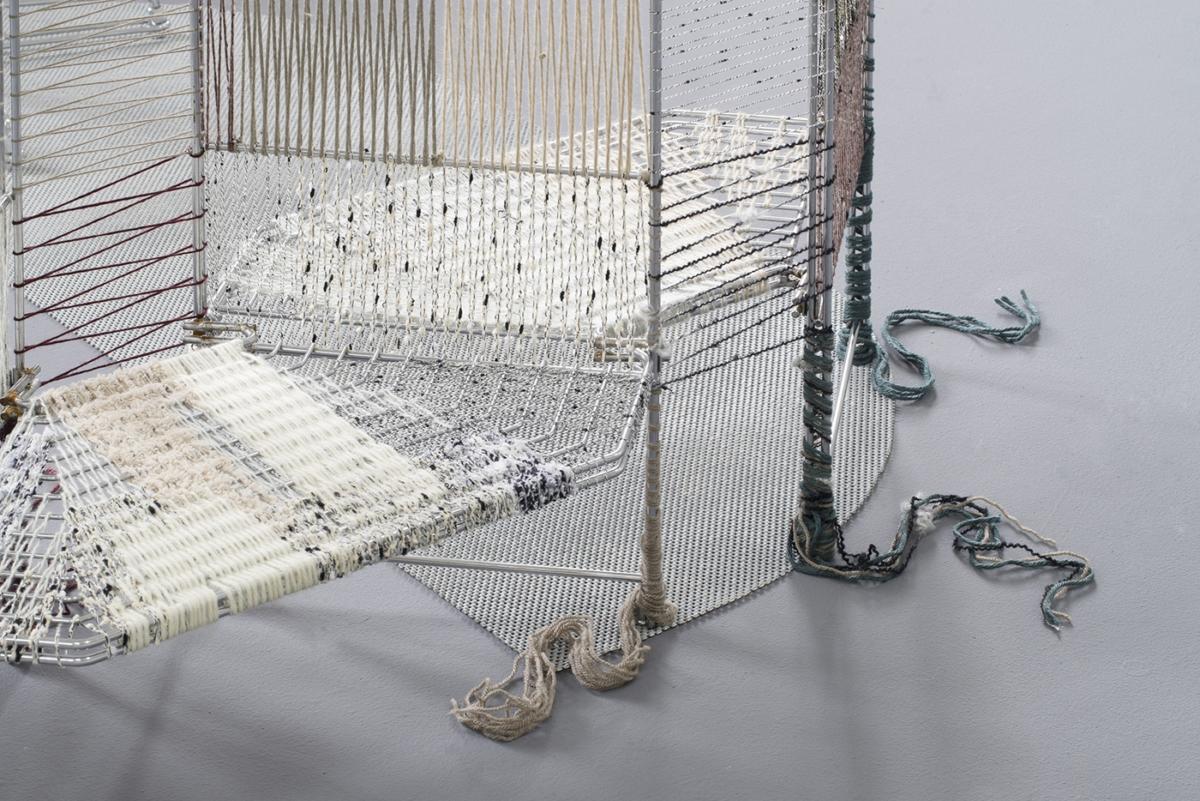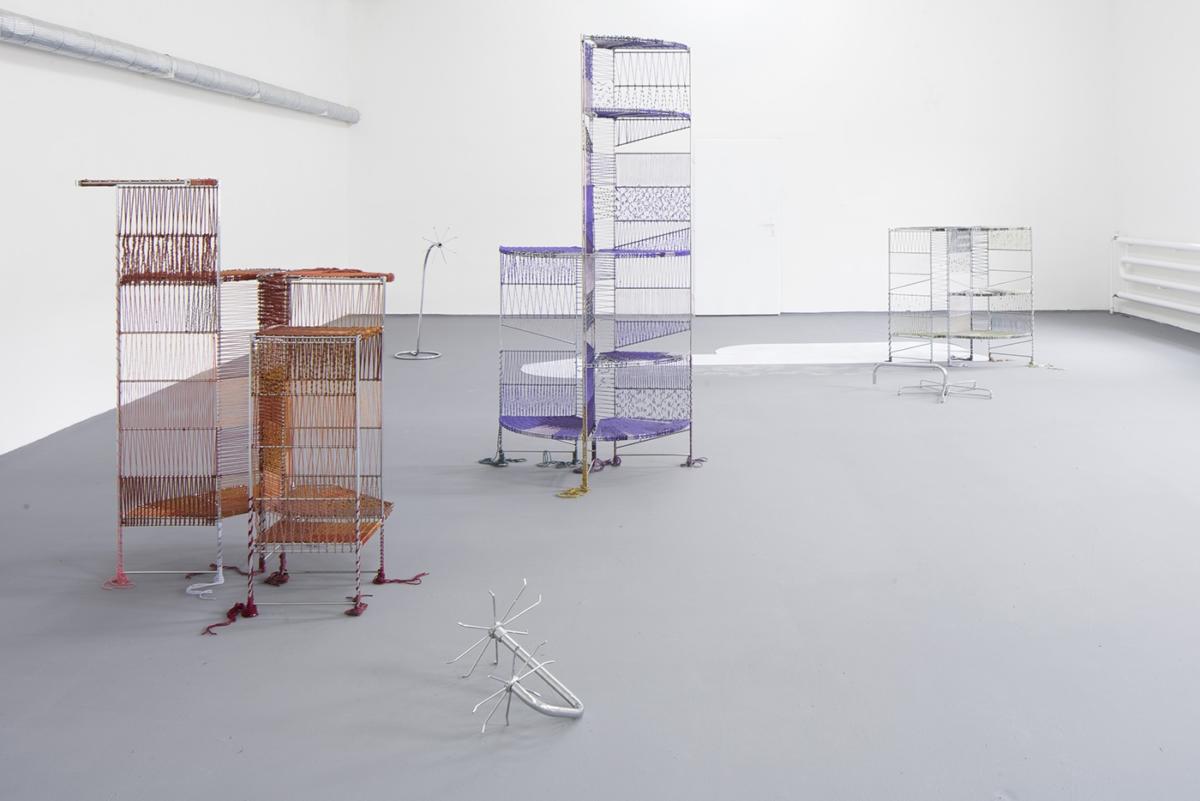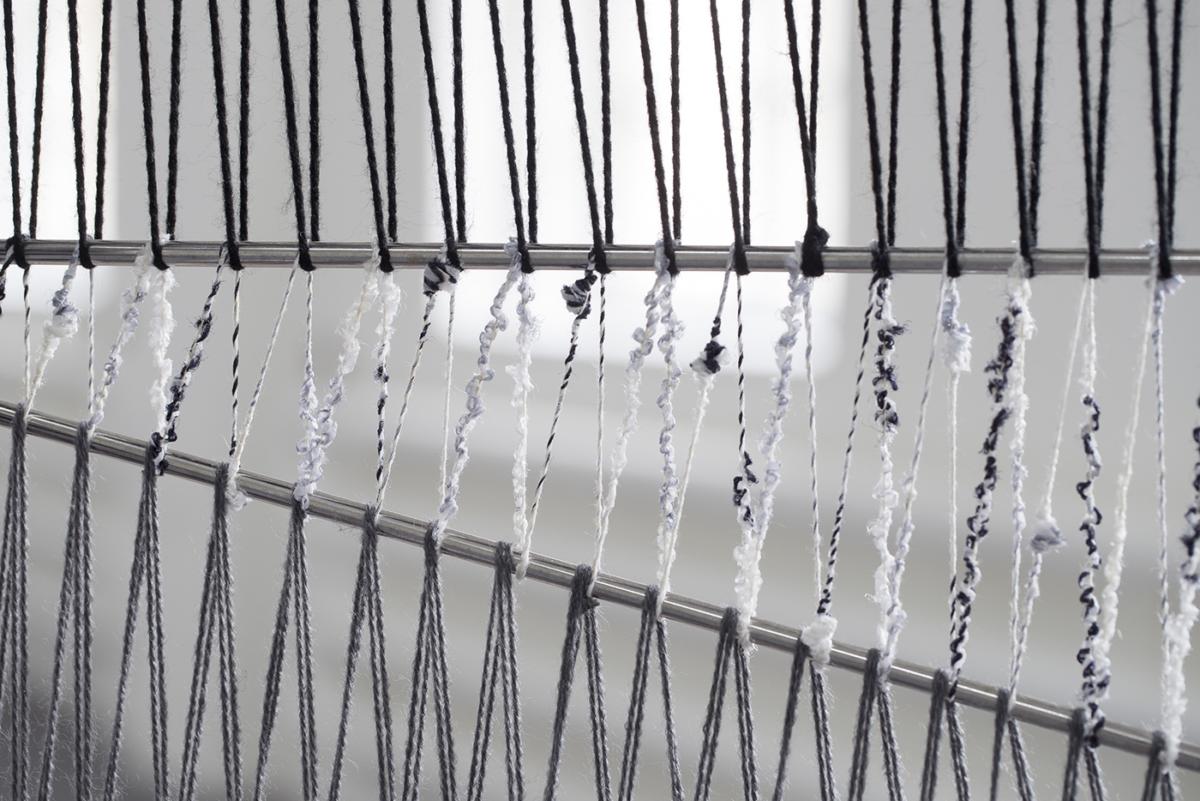[EN/CZ] ‘Tiredness Quotes’ by Barbora Zentková & Julia Gryboś at Karlin Studios
![[EN/CZ] ‘Tiredness Quotes’ by Barbora Zentková & Julia Gryboś at Karlin Studios](https://blokmagazine.com/wp-content/uploads/2020/03/17-2-1200x800.jpg)
[EN]
text by Miloš Hroch
The temperature dropped to twenty degrees below zero on that day. It happened at the beginning of the turbulent year 1972, when the Red Army Faction gunshots could be heard around West Germany, which was why the police, as well as the authorities, were closely watching all, even underground concerts. It was at that time, on January 9, when a krautrock band Can was playing at the campus of The Technical University of Berlin, the epicenter of student radicals. There was a rule in the country for the police to stay clear of academic grounds unless riots come about. The cars and troopers had to patrol outside. Can flew off the handle, they gave over to ritual jamming with its monotone rhythms and psychedelic synthesizers bubbling in-between them. They were adding one one-hour-long piece after another to test the patience of the police. “We were like a football team, but we had no idea where the ball would end,” Holger Czukay from Can describes almost telepathic connection between him and other band members. There was weed being smoked inside the hall and the people stuck out the joints provocatively out of the windows and towards the freezing policemen. “After two hours of playing, Can were totally exhausted but also in a good mood – and they added another one-hour-long encore,” as one of the participants recalls. In the end, the concert took 6 hours and when the crowd began dispersing, almost nobody from the police patrol remained on their positions.
This is when the power of a jamming band was fully demonstrated. It doesn’t solely have to be a hypnotic experience and expression of a close-up connection between the audience and the musicians, but also a political statement and a demonstration of defiance. Or even all of the above mixed together and much more. The collectivity brought exhaustion which was expressed on several levels: in the drummer’s strung muscles as well as in the more and more zonked audience members and, on the other side, in the bone-frozen policemen. Similar details, signs of exhaustion, deterioration and degradation of material constitute the focal point of Barbora Zentková & Julia Gryboś artworks, in which they often work with the medium of jamming group, further exploring its dimensions.




Their current exhibition Tiredness Quotes elaborates on the same topic and follows up to Ostrava’s project Potential Causes of Afternoon Tiredness which the couple set into one of the abandoned buildings in the city center, between the rusting hangers and dingy movables. For their installation in Karlin Studios the artists borrowed a tiny part of furniture from the bankrupt shop and added some new weaved objects. Zentková & Gryboś will let musicians play the motive of the song Dancing in the Dark among the objects to document the way the song gets asymmetrically deformed as a result of fatigue. The exhibition is an admitted citation of Bruce Springsteen’s song from 1984, in which he was venting out his frustration, creative block following a successful record, concerns about not being able to build on it further, and anxiety of the pressures of his record label. During the four-hour-long performance, the hired musicians are going to constantly come back to the song while abandoning it at the same time. Nonetheless, the message is not only in the melodies and tones: it dwells in the drops of sweat on the musicians’ faces, as well as in the guitarist’s sore fingers and in the broken guitar strings and in the pussyfooting of the audience.
It’s not merely a concert at an exhibition opening, but also a sui generis message about the current mindset aimed at constant performance and acceleration of the production. Contemporary sociology works with a so-called drudgery index which recalculates the acceleration by the number of hours that a person earning average salary needs to work to pay the rent in an average flat in a city. In the last 70 years, it has grown in North America alone from 45 to 101 hours and thanks to globalization the situation won’t be much different in the First World. That’s how the current neoliberal system is invariably and uniformly creating debilitating anxiety, where the head commands us to work but the body refuses to exert actions, it fails and protests. Is there really nothing left for us to do, just to “jam” till we drop?
I come home in the mornin’
I go to bed feelin’ the same way
I ain’t nothin’ but tired
Man, I’m just tired and bored with myself






[CZ]
text: Miloš Hroch
Toho dne klesla teplota až ke dvaceti stupňům pod nulou. Bylo to na začátku bouřlivého roku 1972, kdy se Západním Německem ozývaly výstřely Frakce rudé armády, a proto policie a úřady bedlivě střežily i undergroundové koncerty. Krautrocková kapela Can tehdy 9. ledna hrála na kampusu berlínské Technische Universität, který byl epicentrem studentských radikálů. V zemi platilo, že policie má zákaz vstupu na studentskou půdu, pokud se něco nesemele. Auta a pěšáci museli hlídkovat venku. Can se utrhli ze řetězu, oddávali se rituálním jamům s monotónními rytmy a mezi nimi probublávaly psychedelické syntezátory. Přidávali jednu hodinovou skladbu za druhou, aby otestovali trpělivost policie. „Byli jsme jako fotbalový tým, ale netušili jsme, kam míč skočí,“ popisoval Holger Czukay z Can až telepatické napojení na spoluhráče. Uvnitř sálu se kouřila tráva a jointy se provokativně vystrkovaly z oken směrem k mrznoucím strážníkům. „Po dvou hodinách hraní byli už Can úplně vyčerpaní, ale taky v dobré náladě – a přisadili další hodinový přídavek,“ vzpomínal jeden z účastníků. Koncert nakonec trval 6 hodin, a když se lidé rozcházeli, z policejní hlídky už nevydržel na pozicích skoro nikdo.
Naplno se tu demonstrovala síla jamující kapely. Nemusí to být jen hypnotický zážitek a projev semknutí publika s hudebníky, ale taky politické prohlášení a projev neposlušnosti. Nebo všechno dohromady a mnohem víc. S kolektivitou se pojila také únava a ta se projevovala na několika úrovních: v napnutých svalech bubeníka, nebo v řadách stále omámenějšího publika a na druhé straně u na kost promrzlých policistů. Podobných detailů, příznaků vyčerpání, opotřebení a degradace materiálu si všímají ve své tvorbě také Barbora Zentková & Julia Gryboś, které často pracují s médiem jamující kapely a zkoumají jeho další rozměry.




Jejich aktuální výstava Tiredness Quotes rozpracovává stejné téma a je pokračováním ostravského projektu Potential Causes of Afternoon Tiredness, který dvojice zasadila do jedné z opuštěných budov v centru města mezi rezivějící věšáky a zašlé mobiliáře. Ze zkrachovalé prodejny si umělkyně pro instalaci v Karlín Studios vypůjčily nepatrnou část vybavení a doplnily ji o nové vypletené objekty. Mezi nimi nechají Zentková & Gryboś hudebníky hrát motiv písně Dancing in the Dark, aby dokumentovaly, jak se v důsledku únavy skladba nesouměrně deformuje. Výstava je přiznanou citací skladby Bruce Springsteena z roku 1984, v níž se vypisoval z frustrace, kreativního bloku po úspěšné desce, obav jak na ni navázat a úzkostí pod tlakem nahrávací společnosti. Najatí hudebníci se budou během čtyřhodinové performance vracet k songu a zároveň se mu vzdalovat. Sdělení je ale i jinde než v melodiích a tónech: v krůpějích potu na tvářích hudebníků, rozedraných prstech kytaristy, prasklých strunách nebo u přešlapujících návštěvníků výstavy.
Není to jen koncert na vernisáži, ale také svérázná zpráva o aktuálním nastavení zacíleném na neustálý výkon a zrychlování produkce. Současná sociologie pracuje s tzv. indexem dřiny, který takovou akceleraci přepočítává počtem hodin, které musí člověk s průměrným platem odpracovat, aby zaplatil nájem v průměrném bytě ve velkém městě. Za posledních 70 let vzrostl jenom v severní Americe ze 45 na 101 hodin a díky globalizaci nebude situace jinde v prvním světě výrazně jiná. Stávající neoliberální systém tak konstantně a plošně vytváří vysilující úzkost, kdy hlava velí pracovat, ale tělo odmítá vykonávat úkony, selhává a protestuje. Nezbývá nám nic jiného než „jamovat“ do vyčerpání?
I come home in the mornin’
I go to bed feelin’ the same way
I ain’t nothin’ but tired
Man, I’m just tired and bored with myself
Imprint
| Artist | Barbora Zentková, Julia Gryboś |
| Exhibition | Tiredness Quotes |
| Place / venue | Karlin Studios, Prague |
| Dates | 7 March – 12 April 2020 |
| Photos | Tomáš Souček |
| Website | futuraprague.com |
| Index | Barbora Zentková FUTURA Julia Gryboś Julia Gryboś/Barbora Zentková Karlin Studios Miloš Hroch |
